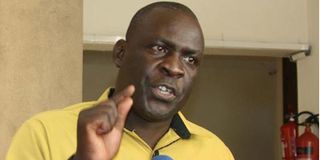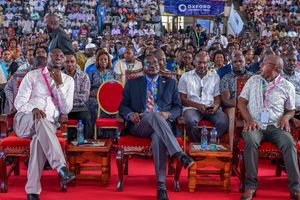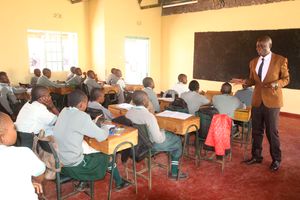
Kenya Union of Post-Primary Education Teachers National Chairman Omboko Milemba at a past event.
The Kenya Union of Post-Primary Education Teachers and the Kenya Secondary Schools Heads Association want senior schools to be allowed to establish Junior Secondary Schools (JSS).
At the same time, principals have issued new proposals for school fees for senior schools ahead of the transition set for January 2026.
About 1.2 million Grade 9 learners currently in Junior School are expected to transition to Senior School in January.
The government has begun making preparations for a smooth transition, including retooling all secondary school teachers and constructing approximately 1,600 laboratories, among other efforts.
But even as these plans unfold, principals have proposed a new fee structure for senior schools.
Kuppet chairperson Omboko Milemba and the Kessha National Chairman Willy Kuria said that establishing JSS within secondary schools will ensure continuity and mentorship, promote infrastructure readiness and enhance equity and access.
Mr Milemba, who is also the MP for Emuhaya, said the union has long advocated for JSS to be part of secondary schools and had written to various stakeholders, including the Office of the President.
“But we did not succeed because of reasons we are aware of. The push is still ongoing, but moving forward, we must change strategy. JSS should be an independent school so that we have three distinct levels: primary, JSS, and Senior School,” said Mr Milemba.

Education Cabinet Secretary Julius Ogamba (left) and National Chairman, Kenya Secondary Schools Heads Association Willy Kuria during the 48thKESSHA Annual National Conference for in Mombasa on June 25, 2025.
He added that JSS should be led by specially trained JSS teachers. Currently, JSS is hosted in existing primary schools and overseen by primary school headteachers.
Unutilised classrooms
“The teachers who are currently teaching JSS should become the principals and leaders of that sector. That would help bridge the gap between teachers in JSS and those in Senior School,” he said.
Mr Milemba noted that many secondary schools currently have unutilised classrooms following the phase-out of the 8-4-4 system and the absence of new Form One intake.
Mr Kuria said senior schools are better positioned to provide academic mentorship and exposure to JSS learners.
“If JSS were hosted in senior schools, teachers would interact more meaningfully, helping to identify learners’ competencies,” he said.
With established infrastructure and experienced teaching staff, Mr Kuria added, the institutions can offer a richer and more seamless learning environment.
He pointed out that many senior schools already have science laboratories, libraries, and ICT facilities, which are essential for implementing the JSS curriculum—especially in pathways such as science, technology, engineering and mathematics (STEM), and applied sciences.
Lack infrastructure
According to the association, some primary schools, especially in urban and peri-urban areas lack the infrastructure needed to host JSS.
“Allowing senior schools to host JSS can ease pressure on primary institutions and help decongest them while expanding access to quality education,” Mr Kuria said.

The Chairman of Kenya Secondary Schools Heads Association Willy Kuria (left) with other Officials during the start of the 48th Annual Conference for Principals in Mombasa in this photo taken on 23rd June 2025.
In Cluster 1 which is the current national schools, principals want the school fees to be capped at Sh73, 182. Cluster 2 and Cluster 3 that is extra county and county schools Sh68, 023 while Cluster 4 which is day schools, parents fork out Sh5, 372.
The association also wants the government to revert to the pre-2018 capitation disbursement system: 50 per cent of the Sh22,244 in Term 1, 30 percent in Term 2, and 20 percent in Term 3.
Principals are pushing for a review of capitation in line with rising enrolment and infrastructure demands to support the transition to the Competency-Based Curriculum at the senior school level.
They also propose that capitation be reviewed every three years to adjust for inflation and improve the learning environment to enhance education quality.
Additionally, they are calling for a review of boarding and lunch fees in public secondary schools to reflect current inflation rates.
The principals further urge the Ministry of Education to provide guidance on how schools should handle cases where Form Four students leave with unpaid fees.
“At the moment, there is a caveat against withholding Form Four certificates as a method of recovering outstanding fees,” said Mr Kuria.







